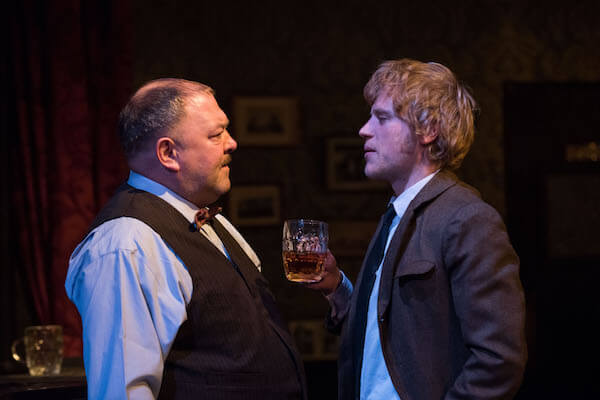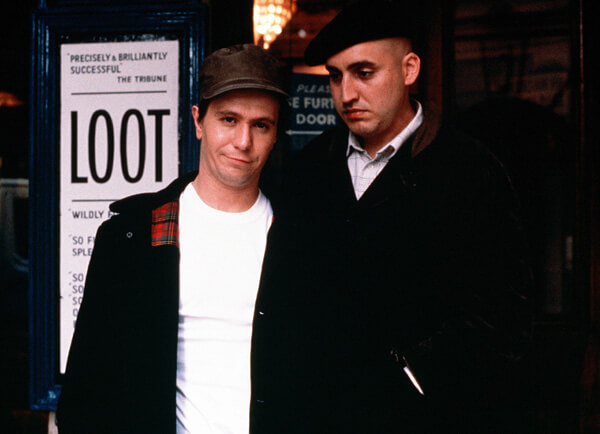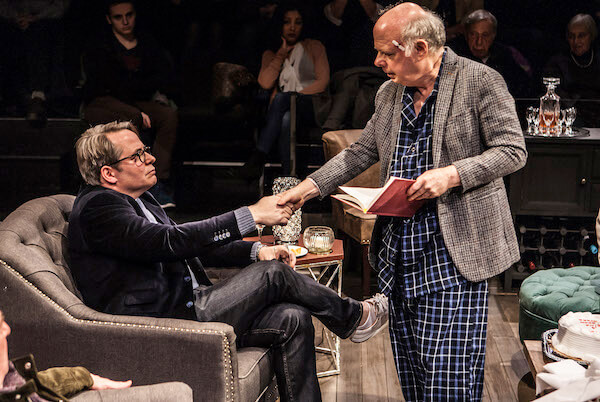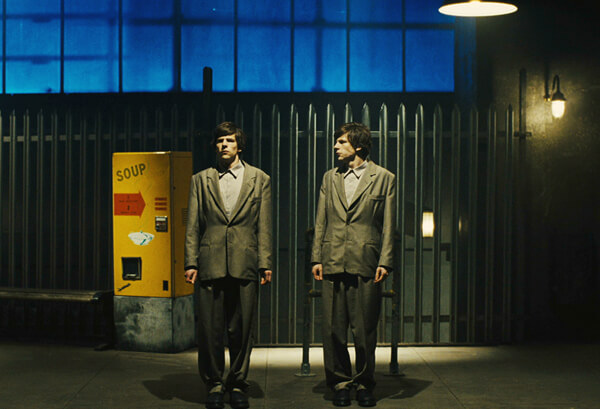The doomed boy prince Mamillius (Rudi Goodman) in “The Winter’s Tale” tells Paulina (Judi Dench), a noblewoman in the Sicilian court, “A sad tale is best for winter.” Most of the productions I saw at Yuletide in London took that to heart and sometimes to extremes, though this “Tale” (through January 16), from the new Kenneth Branagh Theatre Company, making a home at the Garrick with six productions through November, at least offers a moving, redemptive climax. Branagh directs and plays the insanely jealous Leontes himself — letting Paulina tell him the hell off in Dench’s juicy turn. While set in what seems to be the early 20th century, this is as pure and true a telling of the tragic tale as one could want.
The pastoral scenes after the interval are buoyant and sexy, especially the ardent love of prince Florizel (Tom Bateman) for the seemingly peasant Perdita (Jessie Buckley), and blessed with comic relief. But Shakespeare –– and Branagh –– keep us on edge, happiness always threatened with being undone by the demands of the highborn Bohemian King Polixenes (Hadley Fraser) or the intrigues of the low rogue Autolycus (John Dagleish) just as Leontes brought darkness to his kingdom with his jealousy.
Pulling off “The Winter’s Tale” is a high-wire act, and Branagh and company succeed in an auspicious start to their season. Let’s hope it makes it to American shores, but even if it doesn't, it can be seen in cinemas across the US, including Manhattan's IFC Center on January 17 and 18 (323 Sixth Avenue at West Third Street).
British theaters true to Shakespeare's doomed prince saying, “a sad tale's best for winter”
The Rufus Norris Era is now well underway at the National Theatre after 12 phenomenal years under Nick Hytner (who is forming his own company at 59). The theater complex itself has a new look –– hatched under Hytner –– that is more open to the Embankment along the Thames and more casual. The iconic programs, always worth the £4, have a new look, and that’s part of what theater is all about –– taking another look at life that we experience mostly as habit.
Most successful in opening our eyes to a new way of seeing is the National’s wonderfully theatrical adaptation of Charlotte Brontë’s “Jane Eyre” at the Lyttelton devised by director Sally Cookson with the company of actors at the Bristol Old Vic. It is not 100 percent true to the 400-page1847 novel, but creates an engrossing play of a little over three hours on a bare stage fitted with inauspicious, unadorned platforms, ladders, and stairs. (The actors do wear period costumes.)
Madeline Worrall embodies Jane in her endless challenges from infancy to adulthood in a moving performance notable for its endurance, nuance, and numerous surprises. Most of the rest of the actors engagingly play multiple roles across lines of sex, race, age, and specie, notably Felix Hayes as a formidable Rochester and Melanie Marshall, who provides haunting choral accompaniment and plays only Bertha Mason, a mysterious resident of the Rochester manse. The scenes are enhanced by onstage musicians playing music both period and modern.
Sounds as if it could have been a mess, but this “Jane Eyre” has tremendous theatrical and emotional coherence and resonance. “Jane Eyre” (through January 10) is in cinemas worldwide as part of the NT Live series in late January including Symphony Space (2537 Broadway at 95th Street) and the IFC Center (323 Sixth Avenue at West Third Street) in New York. Go to ntlive.nationaltheatre.org.uk/productions/51859-jane-eyre.
Wallace Shawn’s new “Evening at the Talk House,” in which he is also featured and that Ian Rickson directs at the National’s Dorfman, is another matter. What starts hopefully as the reunion of a theater troupe at the London club to which they used to repair nightly descends into surreal nastiness and revelations of murderous violence –– the kind to which we are all contributing with our taxes these days but not nearly so directly as here.
“Talk House” (through March 30) is reminiscent of the social gatherings in a Buñuel film like “Exterminating Angel” and could do with more of his subtlety. The playwright’s voice is distinctive and purposely repellant from the opening monologue (Josh Hamilton as Robert, the playwright), where we are all reminded that in the theater we are all just “animals staring at other animals.” If relentless holiday cheer has been disturbing to you, this heaping cup of rancidness –– which does have its moments –– could be the cure.
“Husbands and Sons,” a compendium of D.H. Lawrence plays adapted by Ben Power and directed by the great Marianne Elliot, also at the Dorfman (through February 10), traffics in a different kind of darkness –– the soot that covers the miners he grew up amidst and the shadows that are cast over their lives above ground. There is no relief from the stress in this northern English town, though some seek it in the bottom of a bottle. The stage is set with the interiors of three households and if all happy households are the same, these unhappy ones are each miserable in their own way.
It sounds off-putting, but not when performed by this fine ensemble led by Anne-Marie Duff in a loveless marriage. It put me in mind of the terrible human price of extracting energy –– from coal to oil to natural gas –– on our withering planet.
You probably don’t know the “Oscar Wilde of the 18th Century,” Samuel Foote, a saucy, cross-dressing, one legged acting star who advanced the Haymarket Theatre to royal status in 1766 through the favor of George III at a time when theater was always being censored or shut down for irreverence. Foote tested the limits –– paying dearly –– and Ian Kelly has brought his 2012 biography of him to the stage (the “new” Haymarket built in 1820), taking the role of the king for himself.
Simon Russell Beale has been a great Hamlet and Lear, and here is the perfect Mr. Foote, surrounded by an estimable company of historic characters and actors who portray them: legendary actors David Garrick (Joseph Millson) and Peg Woffington (Dervla Kirwan), as well as Benjamin Franklin (Colin Stinton). Foote’s Jamaican dresser, Frank Barber (Micah Balfour), and earthy stage manager Mrs. Garner (Jenny Galloway), also contribute mightily to this witty and intelligent production that can be a little hard to follow as it is frantically wound up in the first act, but is painfully clear in the second in charting Foote’s demise. Like Wilde, he faced a sodomy charge and wouldn’t skip town. It is all a reminder of how much our forebears had to suffer for the freedoms entertainers enjoy today.
What’s so good about “Mr. Foote’s Other Leg” is Kelly’s daring to portray historic figures famous for their brilliance and actually coming up with sharp things for them to say and do. “You told me once that the opposite of comedy,” George III says to Foote, “is Germany.”
In “Hangmen” (at Wyndham’s through March 5), playwright Martin McDonagh (in “Pilowman” and “Cripple of Inishmaan”) is back doing what he does best –– taking a bad situation and making it breathtakingly and hilariously worse. When Britain got rid of the death penalty in 1965, it was a good day for everyone but the hangmen.
McDonagh shines a brief light on the last of big executioners, Harry (ferociously good David Morrissey) and Arthur (even scarier Simon Rouse), whose day jobs were as pub proprietors in different towns. This imagining of their transitions to civilian life without the power to kill for the state shows the banality of Harry’s existence, surrounded by dim patrons and family and shrouded in a pompous silence about his grim past work –– broken by an indiscreet interview with the local newspaper and the visit of a young male stranger, Mooney (Johnny Flynn), who is “creepy” or “menacing,” depending on who you listen to, and who triggers a murder mystery that ends in classic McDonagh mayhem.
A caution to Americans: prepare your ear for thick northern English accents for full enjoyment –– maybe by catching up on “Coronation Street.”
At the Royal Court, “Linda” (through January 9) by Penelope Skinner is a cautionary tale of a 55-year old hard-charging executive brought low that was to have starred English-Canadian Kim Cattrall, but she took ill. South African-English Noma Dumezweni took over and carries this tragicomedy heroically. It starts off as what seems like a “crappy soap” (Linda’s phrase for product she brilliantly managed to repackage for her cosmetics firm). But stay with it as plot twists and emotions pile up to a harrowing conclusion, aided by a fine supporting cast playing Linda’s colleagues and family members under Michael Longhurst’s direction.
Dumezweni will be playing the adult Hermione in the new Harry Potter play at the Palace Theatre June 7, 2016 through May 27, 2017.
A show about the bullying of a girl (game Lois Chimimba as Aly) and a gay boy (standout Enyi Okoronkwo) on the vast Olivier stage of the National is one I so wanted to love. But “Wonder.Land” (through April 30), a modern musical take on “Alice in Wonderland,” is afflicted with dull music and lyrics and overblown computer graphics, and costumes that fail to distract from these shortcomings. Young audiences are more sophisticated than this show gives them credit for and few will decide to take time away from their online world to make time for live theater if this is what is offered to them. A rare miss from director Rufus Norris, writer Moira Buffini, and pop composer Damon Albarn, the creators.
Take the District Line to West Brompton, walk east past the Brompton Cemetery, and hang a right on Finborough Road to the Finborough Theatre, where long-buried plays are resuscitated, most recently Robert Bolt’s “Flowering Cherry” (now closed) about the thwarted Cherry family, its first revival in more than half a century. “Kitchen Sink Drama” was the order of the day in 1957, and Bolt scored his first West End production with this one (starring Ralph Richardson). In the tiny pub theater, the first row puts you five feet from a literal kitchen sink.
Bolt went on from this depiction of mundane family squabbles to write the high falutin’ “A Man for All Seasons” and epic screenplays for “Lawrence of Arabia” and “Doctor Zhivago.”
“Cherry” had an able cast, but it was hard to make us feel much for the deluded, drunk father (Liam McKenna) –– though more sympathy was generated for his long-suffering wife, Isobel (Catherine Kanter). Sour plays like this –– including John Osborne’s “Look Back in Anger” –– got theater down to the way people really lived, but with a lot less of the poetry that O’Neill did earlier and better.
COMING UP AND ALSO RUNNING: At the National: “As You Like It” through March 5; “Waste” by Harley Granville-Barker through February 10; August Wilson’s “Ma Rainey’s Black Bottom” (January 26-May 18); Lorraine Hansberry’s “Les Blancs” from March 20; Suhayla El-Bushra’s “The Suicide” (an adaptation of Nikolai Erdman’s 1928 original) from April 6. At the Finborough: In-Sook Chappell’s “P’Yongyang” through January 30. From the Branagh Company at the Garrick: Adrian Lester in “Red Velvet” (January 23-February 27). “The Painkiller” with Branagh and Rob Brydon (March 5-April 30); “Romeo and Juliet” with Derek Jacobi (May 12-August 16); and Branagh in “The Entertainer” (August 20-November 12). At the Royal Court: Caryl Churchill’s new “Escaped Alone” (January 21-March 12). At the Old Vic: Ralph Fiennes in Ibsen’s “Master Builder” (January 23-March 19); Timothy Spall in Pinter’s “Caretaker” (Mar. 26-May 14). For complete listings, go to londontheatre.co.uk.
EXTRA: Check out the “Artist and Empire: Facing Britain’s Imperial Past” exhibit at the Tate Britain, a sweeping look into a Britain that once ruled two-fifths of the planet, providing insight and context for the impossible mess the world is in today.








































